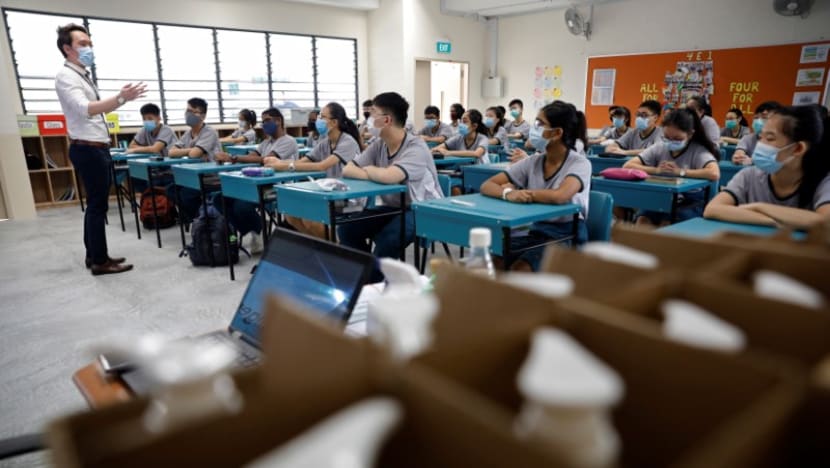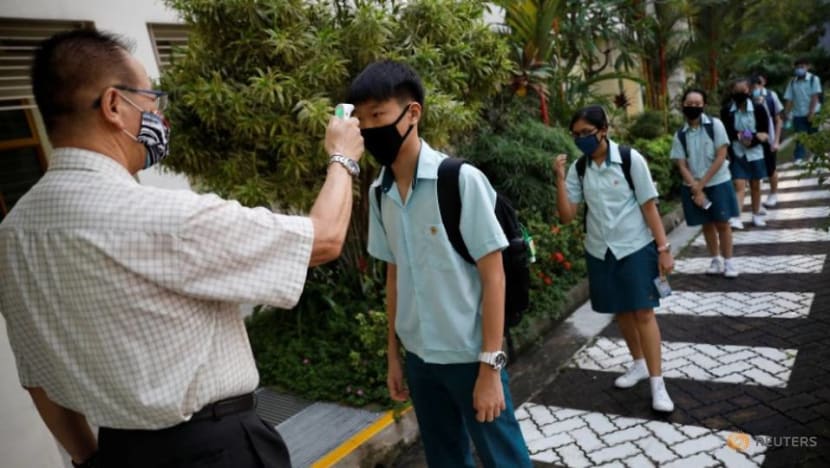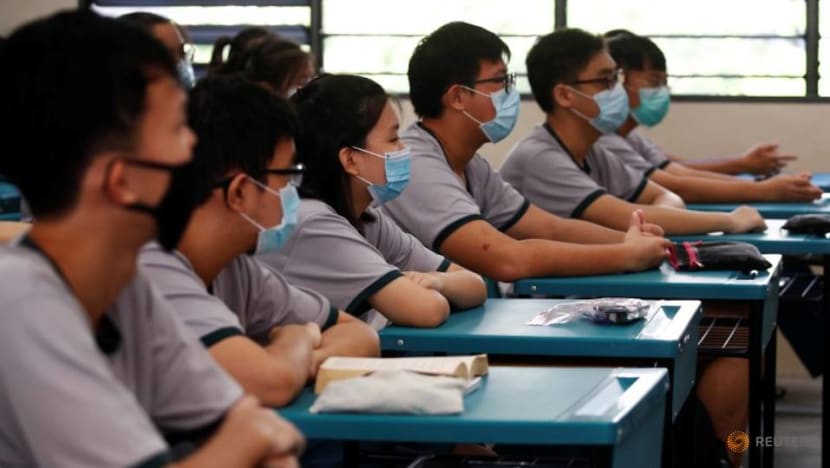commentary Commentary
Commentary: Teachers can focus better if subjective, irrelevant factors removed from annual appraisals
Standarise what goes into performance appraisal, formalise guidelines and get rid of quotas for grades, suggests Member of Parliament (PAP-Nee Soon) Louis Ng.

A teacher explains to students the new protocols for taking recess breaks and daily temperature checks at Yio Chu Kang Secondary School, as schools reopen amid the coronavirus disease (COVID-19) outbreak in Singapore Jun 2, 2020. (Photo: REUTERS/Edgar Su)
SINGAPORE: I saw first-hand the dedication of our teachers last month when my daughter Ella started her Primary 1 journey.
It was not an easy transition for her. In her first week, she entered school every morning in tears.
But it was comforting for us to know the teachers were there. I saw them holding Ella’s hand and offering her a tissue to wipe her tears.
These experiences reminded me of how much the work of a teacher go beyond teaching to involve a larger labour of love.
Teachers have a tough job. They devote time to create a nurturing environment for our children. We, in turn, should ensure they too have a nurturing environment to work in.
READ: Commentary: After the craziest year, teachers start first day of school with nervous apprehension
Yet today, teachers are ranked in their annual appraisal, a practice for some time that has gained concerns.
STRIDES IN MAKING EDUCATION A NURTURING EXPERIENCE
MOE has done a lot to make education a more nurturing experience.
We stopped reminding students of how they are ranked in both class and level. We stopped grouping them into form classes based on academic abilities. We stopped comparing students to their peers when grading the Primary School Leaving Examination (PSLE).
READ: Commentary: PSLE scores and the problem with the beloved late bloomer narrative
The message to students has been clear: Focus on your own learning. Don’t be distracted by how others are doing.
As then-Education Minister Ong put it in a 2018 address to school teachers: “Learning is not a competition, but a self-discipline you need to master for life”.
Indeed, we have achieved much in helping our students focus on their own learning. But we have not done enough for our teachers.

As teachers tell students they will no longer be ranked and compared relative to their peers, they themselves ironically continue to be ranked and compared relative to other teachers.
STANDARISE APPRAISAL PROCESS
I spoke up about this in Parliament last week. Instead of throwing the baby out with the bath water, I suggested we make the appraisal system more standardised, transparent, fair and formative, to better support our teachers to do their best work.
My first proposal is to standardise the appraisal process and require schools’ adherence.
Teachers have shared with me that subjective and irrelevant considerations are sometimes taken into account in their assessment. One teacher said that some Reporting Officers (RO) who assesses the teacher, prefer “yes men”.
“If you are one who asks questions and give alternate suggestions, you are deemed to be uncooperative and calculating”. It should worry us that some teachers feel this way.
READ: Commentary: Teachers now have new jobs. Schools will never be normal again after COVID-19
Even if the RO thinks that a teacher has met or exceeded his or her targets, strangely this doesn’t mean that the teacher will get a good grade. They have to fight for the teacher at the Ranking Panel, consisting of senior staff members who decide on the rank and grades of all teachers in the school.
Many ROs, themselves, feel frustrated by the Ranking Panel. They flag the role of personalities and politics.
One RO said those on the panel tend to play up their own teachers while criticising others so that they themselves can be ranked as effective supervisors.
Another RO fretted about retaliation, saying that to speak up for unfairly ranked teachers means to risk “suffering the same fate”.
READ: READ: Commentary: Work appraisals can’t depend on what your boss thinks of you
We should be concerned that some ROs feel this way. There is more that we can do to standardise the process. First, MOE can provide greater clarity to its guidelines.
Just like the detailed marking rubrics used for students, existing guidelines like the Key Result Areas should be broken down by grade so teachers know what the specific standards required to achieve an A, B, C and so on are.
Clearer appraisal standards given to ROs and Ranking Panels make it harder for subjective and irrelevant considerations to enter into decision-making.
READ: Commentary: Teachers love their jobs and feel valued but face immense challenges
Second, MOE should formalise its guidelines on teacher appraisal. Good guidelines are not so useful if they can be ignored or circumvented.
Teachers and ROs alike have said that the appraisal process varies sharply from school to school. These stricter standards will move us towards consistency, limit biases and emphasise the performance of teachers.
FORMALISE GUIDELINES FOR APPRAISAL AND FEEDBACK
My second proposal is for MOE to enforce a clearer and more consistent feedback policy for performance appraisals. The feedback I hear is that teachers do not feel the process of ranking has been made transparent.

Currently, the feedback policy schools must follow when conducting their annual appraisal exercise are merely guidelines.
Some teachers say the process is opaque, with information not proactively offered to some. One teacher even said: “The grades were never explained to me for the years I joined service”.
Even when some teachers asked about the process, they are given no explanation. One teacher sought to understand why they received that grade, but their RO said that there was no way to discuss the performance grade.
There are many more stories like these.
How can anyone do better if they don’t know what they are doing wrong? It must be frustrating to be in such a situation.
READ: Commentary: Your PE teacher’s secret headaches during a year of COVID-19
We can work together with teachers to strengthen MOE’s communication policies and make it mandatory to follow. We can implement a whistle-blowing mechanism for teachers to use when their schools fail to abide by MOE’s communication policies on appraisal.
Together, these measures will foster a more transparent system where our teachers will always know how to do better.
REMOVE QUOTAS FOR EACH GRADE
Third, I propose we remove the quota for grades, so a teacher’s grade would no longer be affected by the limited number of As, Bs, Cs and Ds.
Today, the mandatory quote means that 5 per cent of each school’s teachers must be graded C-, D or E. If you are a good teacher in a school overpopulated with super good teachers, the quota may see a terrible grade forced on you.

The quota would not be so painful if bad grades had little implications. But those receiving C- grades and below face a host of punitive measures, including ineligibility for promotion for three years and ineligibility for Professional Development Leave.
We should also remove punitive measures for C- grades and below. Performance management should be formative, not punitive.
Teachers who have struggled should not be denied resources to grow or the prospect of being rewarded. Three years with zero chance of promotion is enough to make anyone lose interest in their profession.
READ: Commentary: How to sabotage your child’s future – five dangerous notions about life, careers and education
MOE would not be alone in this shift. Some of the most successful companies in the world have moved towards more flexible performance management systems. Amazon announced in 2016 it would drop its stack ranking system.
Even General Electric, where stack ranking was popularised, has dropped it. CEO Jeffrey Immelt said he prefers reviews that candidly tell an employee where they are not measuring up and what they need to do to improve, without rigidly adhering to certain percentages.
READ: Commentary: Public trust in our educators is fragile and can be easily fractured
PLANT THE SEEDS TO A NURTURING EDUCATIONAL ENVIRONMENT
I ended my speech in Parliament with this beautiful quote, “A teacher plants the seeds of knowledge, sprinkles them with love, and patiently nurtures their growth to produce tomorrow's dreams”.
As teachers work hard to create a nurturing environment for our children, let’s also create a nurturing environment for them.
Our performance management system of stack ranking may be viewed by many to be a sacred cow. We have used this system for decades.
I’m not asking for a scared cow to be slaughtered. As a vegetarian, I’m asking for us to look after this sacred cow better and for our teacher appraisal system to be more standardised, transparent, fair and formative.
That way, teachers can continue to focus on what they do best: Nurturing the minds of tomorrow.
Listen to three working adults reveal how their PSLE results have shaped their life journeys in a no-holds barred conversation on CNA's Heart of the Matter podcast:
Louis Ng is Member of Parliament at Nee Soon GRC. This commentary was adapted from his Budget 2021 speech in Parliament.














